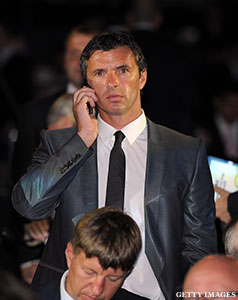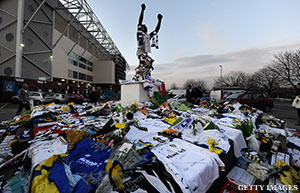
England's soccer union has launched an extensive campaign aimed at combating player depression in the wake of Wales manager Gary Speed's apparent suicide last weekend.
Although the commonly held perception of soccer stars is that they enjoy a carefree life while earning big money to play the game they love, Speed's death and the suicide of German goalkeeper Robert Enke last year has set off alarms among the sport's administrators.
The Professional Footballers Association has commissioned a 36-page book that includes the experiences of athletes who have suffered difficulties during or after their careers. The book will be sent to 4,000 current players and made available to 50,000 former players.
"Mental problems have to be treated with understanding," says Gordon Taylor, chief executive of the PFA. "Players can have panic attacks, fail to come to terms with leaving football, finishing as a player, or
the pressures of being a manager. We want to do all we can to try to avoid another tragedy like this.
"The booklet went out at the beginning of the season and after what has happened with Gary Speed, we have decided to widen its circulation and let people know there is a support system out there for them to turn to."
This week's Yahoo! Soccer Podcast featured a discussion on depression in soccer, and included commentary from former United States international Jimmy Conrad. He spoke of the difficulties faced by players both away from the field during their careers, and in adjusting to life out of the spotlight following retirement.
British correspondent Aidan Magee of Sky Sports insists that while the PFA's actions are commendable, more should have already been done to prevent the problems suffered by Speed, Enke and others.
Speed was found hanging in his home in Northwest London on Sunday, and his death prompted an outpouring of sorrow in the soccer community. Peter Shuttleworth of BBC Wales spoke of how the region was in a state of mourning, with tributes flooding in from players, coaches, fans and even British Prime Minister David Cameron.

German soccer writer Jon Hartley broke down the story of Enke, who was at the top of his profession and in the best form of his career when he tragically took his own life. Despite his on-field success, he had been unable to cope with the personal trauma caused by the death of his baby daughter.
Finally, renowned soccer author Simon Kuper joined the chat to give some views reflected in his latest book, The Soccer Men. Kuper spoke of how, in contrast to the perception of a life of glamour, many players lead a lonely and somewhat isolated existence.
Depression in soccer is a topic that has been raised before, but perhaps never treated with enough validity or seriousness. Former England international Stan Collymore suffered from it during his time at Aston Villa and he was ridiculed by then-manager John Gregory.
Collymore, a hugely talented player who never reached his full potential, spelled out his issues on his own Twitter account. Although now a successful radio and television personality, he still battles with depression on a constant basis.

"It's 4:48 a.m. in the morning and I'm wide awake," he wrote on Saturday. "I decided to Tweet my own personal experience of my latest bout of depression yesterday, and firstly wanted to thank the hundreds of messages from friends, journalists, mental health workers, doctors, and sufferers, as well as well-wishers.
"I want to elaborate on what depression is for me, as the illness has so many facets, and varies from bout to bout, that it can be hard to explain to a fellow sufferer, never mind someone fortunate enough to have
never been afflicted.
"I keep myself in really good nick, I run (six miles) every week day, and only not go to the gym or exercise at weekends, when I commentate on football. The running I find really has helped massively, as I'm sure
you guys that suffer who exercise find, the tangible release of calm, and 'being on top of things' powers your internal dynamo, and keeps the black dog from the door."
The efforts of Collymore, the PFA and others can hopefully bring the issue of depression into the public sphere and more can be done to help players who suffer.
Sadly though, it is too late for Gary Speed.

Popular Stories On ThePostGame:
-- America's Scariest Fitness Trends
-- Video: Treadmill Dancing Queen Storms The Web
-- Meet CNBC Reporter/Fitness Buff Erin Sharoni
-- NBA Announcer Chris Carrino: My Battle Against FSHD Muscular Dystrophy




